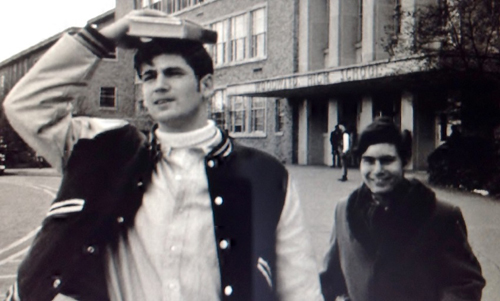
By Rabbi Ben Kamin
ENCINITAS, California –Even the fabled Cincinnati high school, Woodward, is no more—bulldozed into rubble more than a generation after a host of us, now aging and sentimental, lived through the best and worst of the 1960s within its rumbling, sometimes treacherous walls. My lifelong friend Steve, who is seen standing (above) next to me in “the front circle” of the behemoth institution, lamented: “They have torn down our temple.”
The structure is gone, the bittersweet memories of blood and breakthrough linger, some of us have died already (including in Vietnam) but none of us could have imagined what I see myself scanning for back in 1969. The world was breaking apart then; now it is as broken as it is cybernetic. None of us could have imagined then what we actually now see in 2014—from a beleaguered black president to a universe of terrorist-driven security to American tourists flocking on holiday to Vietnam.
Iraq is a tragic hiccup (if a dreadful symbol) compared to Vietnam when Steve and I gazed forward in 1969. The trauma of that war, with its napalm, savagery, corruption, as well as the ravaging of the Vietnamese people and the Indochinese landscape wove its way into the psyches and lives of Woodward’s young men—even as we dealt with the draft and with death.
We were experimenting, as we were supposed to, with sex and cigarettes and alcohol, we were reckless with drugs, we were fantasizing about the girls’ hot pants and the way they smelled and felt up close, but we were distracted by the images of body bags and jungle infernos and POWs and the terrifying possibilities that lay in store for us once we graduated high school and student deferments were no longer an escape.
All we boys wanted, however, were car keys and conquests. What we wanted was normal. What we got in ’67, ’68, and ’69 was aberrant but truly indelible. What other generation could decide to pick between Martin Luther King, Jr. (“I have a dream!”) and Governor George Wallace (“Segregation now, segregation tomorrow, segregation forever!”) as role models?
What generation since has loved, truly loved, a good cross-section of our national leaders, be it the grandiloquent Rev. King or the strangely aloof but perceptive Senator Eugene McCarthy or the elegiac and compelling and late-maturing Senator Robert F. Kennedy?
We were afraid, we were wary, we were in danger in those days, but we actually had personal feelings of connection and intimate affinities with many of the men and women who led us in politics, music, poetry, and social justice. And we mourned the martyrs of the time, the iconic Kennedy brothers as well as Dr. King, but also a host of guitarists and lyricists and writers and countless, faceless soldiers, nurses, chaplains, and students and housewives who marched and even died in favor of a better society that cherished values more than valuables.
And the words of the more famous ones—from the Beatles to Bobby—are words that we recall, as clearly as we remember the words of our parents, or the first movie we saw with that certain date, or what transpired in the city high school which I attended from the inception of the federal government’s civil rights legislation in 1964 through to Woodstock and the Apollo moon landing of 1969.
Steve and I saw the moon back then but what we got is an earth where hope is as bleak as the lunar landscape. But at least we remember what we saw and what we dreamed.
*
Rabbi Kamin is a freelance writer and author based in the San Diego suburb of Encinitas, California. He may be contacted via ben.kamin@sdjewishworld.com